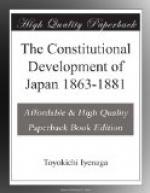These reasons were nine in number and were developed at great length. Eight of them formed a direct impeachment of the present government, and the ninth was a reminder that the solemn promise of 1868 had never been fulfilled. “Nothing,” they conclude, “could more tend to the well-being of the country than for your Majesty to put an end to all despotic and oppressive measures, and to consult public opinion in the conduct of the government. To this end a representative assembly should be established, so that the government may become constitutional in form. The people would then become more interested and zealous in looking after the affairs of the country; public opinion would find expression, and despotism and confusion cease. The nation would advance in civilization; wealth would accumulate in the country; troubles from within and contempt from without would cease, and the happiness of your Imperial Majesty and of your Majesty’s subjects would be secured.”
But again the government heeded not, its attention at the time being fully occupied with the suppression of the Satsuma Rebellion. The civil war being ended, in 1878, the year which marked a decade from the establishment of the new regime, the government, persuaded that the time for popular institutions was fast approaching, not alone through representations of the Tosa memorialists, but through many other signs of the times, decided to take a step in the direction of establishing a national assembly. But the government acted cautiously. Thinking that to bring together hundreds of members unaccustomed to parliamentary debate and its excitement, and to allow them a hand in the administration of affairs of the state, might be attended with serious dangers, as a preparation for the national assembly the government established first local assemblies. Certainly this was a wise course.
These local assemblies have not only been good training schools for popular government, but also proved reasonably successful. They hold their sessions every year, in the month of March, in their respective electoral districts, and there discuss all questions of local taxation. They may also petition the central government on other matters of local interest. The members must be males of the full age of twenty-five years, who have been resident for three years in the district and pay the sum of $10 as a land tax within their district. The qualifications for electors (males only) are: an age of twenty years, registration, and payment of a land tax of $5. Voting is by ballot, but the names of the voters are to be written by themselves on the voting papers. There are now 2172 members who sit in these local assemblies, and it was from the more experienced members of these assemblies that the majority of the members of the House of Representatives of the Imperial Diet, convened for the first time last year, were chosen.




